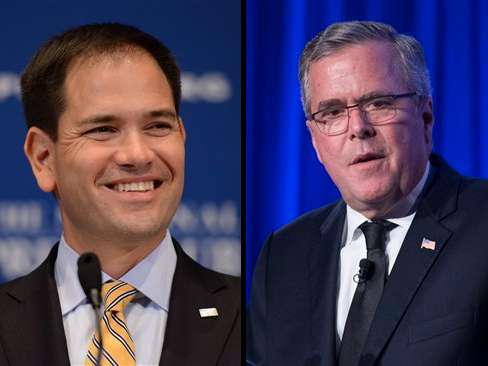A Florida presidential poll from Public Policy Polling (PPP) reveals support for former Governor Jeb Bush (R-FL) has dropped five points since a similar PPP survey last June. Meanwhile, support for Sen. Marco Rubio (R-FL) increased by 1 percent.
Many political prognosticators predicted that Bush would cannibalize Rubio’s chances for victory, drawing away both votes and donor funds, but this poll may indicate Bush’s weakness is opening a door for Rubio.
The poll surveyed 923 registered Florida voters, including 425 Republican primary voters and 371 Democratic primary voters, from March 19 to 22. The margin of error was +/- 3.2 percent overall, +/- 4.8 percent for the Republican sample, and +/- 5.1 percent for the Democratic sample.
Among the entire field of likely Republican presidential candidates, Bush leads with 25 percent, then Governor Scott Walker (R-WI) at 17 percent, Rubio at 15 percent, neurosurgeon Ben Carson at 12 percent, former Governor Mike Huckabee (R-AR) at 7 percent, Senator Ted Cruz (R-TX) at 6 percent, Governor Chris Christie (R-NJ) at 4 percent, Senator Rand Paul (R-KY) at 4 percent, and former Governor Rick Perry (R-TX) at 3 percent.
Since PPP’s June poll, Walker’s seen the biggest increase, gaining ground from 7 percent. Paul lost 7 points, Christie lost 4 points, and Cruz lost 3 points. Huckabee remained unchanged at 7 percent. Carson was not included in the June poll.
It should be noted that this poll was completed before Cruz officially launched his presidential campaign, with a Tweet posted just after midnight Eastern Time, followed by a speech at Liberty University, on Monday. To date, Cruz is the only candidate officially in the race, although Paul is expected to announce around April 7, and political chatter has Walker, Rubio, and Perry making their moves later in April or May.
Once more candidates have thrown their hats in the ring, the polling numbers will undoubtedly shift even further — especially once debates begin.
For now, the candidates are jockeying for position by trying to garner positive earned media at events like CPAC, appearances around the early primary states, by locking in elite consultants and staffers, and connecting with high-level Republican donors.
The goal is to create an impression of not just viability, but inevitability, as a candidate who can not only raise the funds and organize a campaign that will survive the Republican primary, but to also be able to defeat the Democratic nominee. After frustrating back-to-back losses to Obama by two candidates, Senator John McCain (R-Arizona) and former Governor Mitt Romney (R-Massachusetts), who failed to connect with voters, Republicans want to back a winner.
This week’s PPP poll showed that, in a head to head match-up, former Secretary of State Hillary Clinton (D) leads both Bush and Rubio slightly, but Rubio performs a little better; Clinton has a two point advantage over Rubio (48 percent to 46 percent) and three points over Bush (47 percent to 44 percent).
A recent report by The New York Times describes Bush’s efforts to convince the Republican electorate that he is their best chance, telling of a “muscular outreach” that relies “on a highly personal touch and the tug of loyalty to a man who ushered in what has been a 17-year stretch of Republican state government” in Florida.
“Mr. Bush and his team are rushing to lock up Florida’s best-known political operatives, elected officials and campaign donors — offering them contracts, face time and blandishments, according to those who know of the tactics,” writes the Times, adding that the Bush team is expecting to spend up to $50 million in Florida alone before Election Day.
Bush’s network in the Sunshine State is vast, and he has worked hard over the years to maintain these relationships. Many of the consultants, staffers, and volunteers who were a part of Rubio’s successful 2010 Senate race had prior experience with Bush, either on his campaigns or working for him as Governor or with the Republican Party of Florida. The story is the same with many of Florida’s top Republican donors. With Bush coming along first and having more time to develop and nurture his political relationships, the expectation has been that in a battle between Bush and Rubio, Bush would prevail with the majority of people.
However, if Bush’s polling numbers continue to slip, convincing top level consultants, donors, and other supporters to publicly back him becomes more challenging. Bush’s position on immigration is to the left of most of the Republican field, and his vocal support for the Common Core educational standards is an unforgivable sin for many voters across the political spectrum, but is especially anathema among the conservative wing of the Republican party. These two issues — plus a feeling of “Bush fatigue” among voters unenthusiastic about political dynasties — may well create a ceiling for Bush’s support, even in Florida.
Tallahassee Republican strategist Rick Wilson, who has advised both Bush and Rubio, tells Breitbart News that he did not believe Bush necessarily had locked in an advantage over Rubio, even among donors. “Although Jeb Bush is a fundraising juggernaut, there are still a lot of hearts and minds to be won in the donor community,” said Wilson.
Florida set its primary date for March 16, 2016, the earliest date possible under Republican rules without sacrificing half of Florida’s delegates to the party’s convention. It will be a winner-take-all primary, awarding a total of 99 delegates to the victor, and could be a devastating blow to Bush’s campaign if he loses.
Follow Sarah Rumpf on Twitter @rumpfshaker.

COMMENTS
Please let us know if you're having issues with commenting.